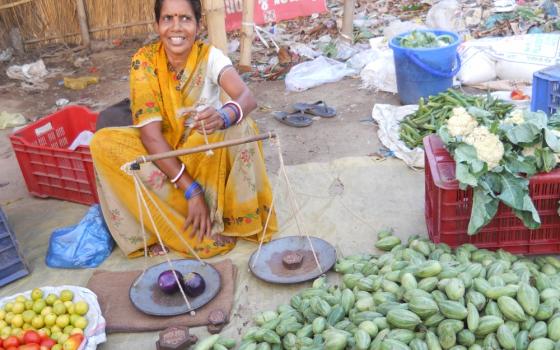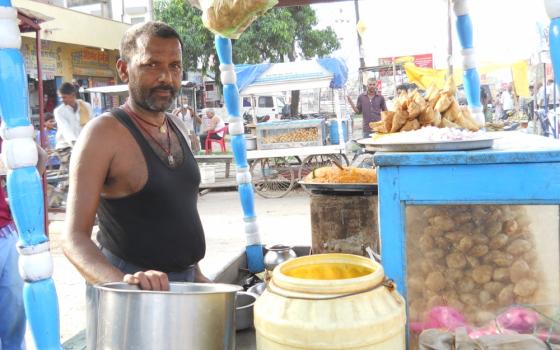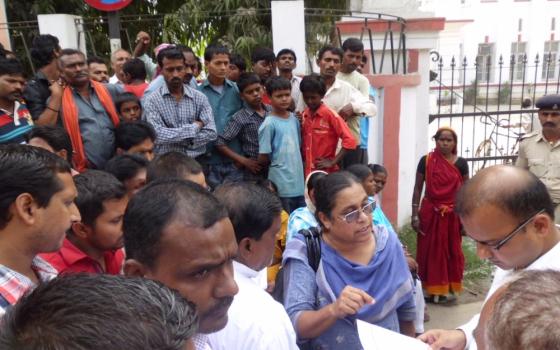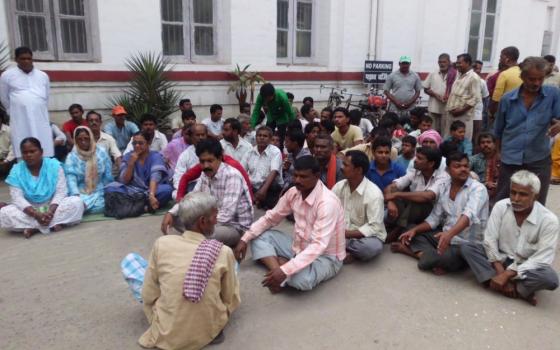I work with Aashray Abhiyan, a small organization in India which is engaged with campaigning for the rights of the urban poor. We, along with many others, work among the teeming millions across our globe who are forced to live on the margins. There are many approaches that have brought relief to struggling people. The shift from charity to development to a rights-based approach has been an unfolding restoration of the lost dignity and humanity of people.
In the charity model when people were hungry we gave them fish to eat; whereas, with the rights-based approach we enable people to ask the question why they are hungry. Even when they labor hard, why is it that they have no access to basic amenities of life? They are being taken for granted. This has to change, so they have to stand up for their rights. However, there are some times we as an organization are invited to respond on the basis of charity when natural calamities strike the people with whom we are engaged.
We here in Patna, Bihar, have over the past decade focused on our work from the perspective of the rights-based approach. This invites us to constant openness, to be alert to the policies that are being framed by the government in favor of people and to study and advocate for them.
Right to livelihood
For those who are thrown on the margins of society, life becomes an ordeal. They struggle to keep the body and soul intact. Our urban and rural poor are deprived of higher and professional education; so most of them engage in petty works in order to earn a livelihood and keep the fire burning. Being unskilled and often having poor education they take to being vendors, daily wage earners, construction earners, cycle rickshaw pullers, domestic help, sweepers and garbage collectors. Some are street vendors.
We at Aashray Abhiyan are engaged with the vendors around the main points of the city. Gandhi Maidan in Patna is a central hub of activity and connectivity with road transport. Rajendra Nagar Railway Terminal is a busy place. Anta Ghat is a whole sale vegetable market there where life is very hectic and busy.
These vendors have been harassed by the law enforcing agencies and the administration. They wish to extract money from the vendors on a daily basis. They make one excuse or the other to force the vendors to leave the site and confiscate their goods. This has been going on for a long time. Initially Dhanajay Kumar, the coordinator for this work, and I visited the vendors weekly to understand the reason for harassment. Early morning visits to Rajendra Nagar on cold winter mornings to meet the person in charge all fell on deaf ears, though there was a respite for a brief time of about a month.
Street Vendors Act 2014
During this long struggle, the government of India brought into effect the Street Vendors Act 2014, in February. But so callous and insensitive are the administration and the bureaucracy that they have been violating this act and continue their old practices of harassing the vendors.
Aashray Abhiyan’s work on advocacy has brought us face to face with the administration, and we realized that we had to organize sit-in protests for a day and meet with the bureaucracy to make them aware of the act. Representatives from among the vendors at Rajendra Nagar joined me when we met with the district magistrate and the divisional commissioner of Patna. We have organized the vendors to oppose such inhuman practices.
The Honb’le Supreme Court of India had given directions to all state governments for the implementation of the act. We have been using every opportunity to bring this to the notice of the bureaucracy. The urban and housing department of the government of Bihar, through its various departments, have failed to implement the act. They are supposed to set up a Town Vending Committee, with representatives of vendors from the locality. They are supposed to survey the vendors, issue licenses and declare zones for approved vending. According to the act this was to be implemented in six months; it has now been over a year. Through Aashray Abhiyan, I have filed a PIL (Public Interest Litigation) in the Hon’ble High Court of Patna.
The vendors at Rajendra Nagar railway station
The vendors at Rajendra Nagar railway station in Patna have been having quite a tough time for the past year. Every time there is a new officer of the Railway Protection Force (RPF) or a new person from the administration or the law enforcing agencies, they make demands that the vendors pay to keep their shops there. During our interventions with either the traffic police or the RPF, they have always brought up new issues. The underlying truth is that the RPF and the administration are bent on harassing the vendors and wish to collect and pocket money from them for putting up shops there.
Our encounters with the Traffic Police likewise have been very tough. Though we have made them aware of the fact that the Vendors Policy Act has been passed by the Lok Sabha (lower house of Indian parliament) in February 2014, they are still brazen about harassing the vendors on one pretext or the other. They simply do not allow them to set up their shops. If they do, the vendors have to pay, or their goods will be confiscated without the right to do so or without any replacement. We have furnished them with a copy of the act and the news items from the daily newspapers of Patna, but they do not wish to abide by this and use the old law and sticks to beat up people and demand money.
When things were turning nasty, for days and weeks the shops were forced to be closed, which meant there would be no access to money or food at home for the vendors. We met with the DRM (Danapur Railway Manger) who is the head of the Danapur railway divisional zone. He was very empathetic and sent us to the commando who deputed an officer to do some fact finding. The officer came to the spot and took down the statement of those who had complaints.
Later we tried to bring the response of the sub inspector of the RPF to the awareness of the officer, S. Nath. We were hopeful that things would be resolved, but to our dismay many officers on one pretext or the other continue to harass the shopkeepers. Now a new story is being portrayed; they are saying that the footpath where the vendors set up their stalls belongs to the railway authorities.
There seems to be a nexus created by the railway police and some of the middlemen who work as informers for the police who are bent on harassing the vendors. This we can vouch for as the RPF has given strict instructions to the Traffic Police that if the vendors open their shops, they will be fined.
We have tried to bring this to a logical conclusion. We are not giving in: we stand by the vendors and ensure that they are not evicted from the sites and denied their livelihood.
In order to give the vendors a sense of security, Dhanajay, our coordinator, visits them regularly. If there is urgent need of our presence the vendors call and we enter into dialogue with the RPF. We have issued identity cards to the vendors to indicate that they belong to an organization and cannot be harassed.
The struggle goes on and we will not stop as long as injustice continues. We have adopted various strategies. We make regular visits to the vending sites. When we go meet with the bureaucracy, we take the vendors along with us. When we meet with the lawyer they are present, too, so they are in the know of what is in process. We also encourage them to open their shops for shorter intervals of three to four hours a day to ensure that people do not give into crime, since they have no other option. Our visits to the district magistrate to apprise him of the situation have received an apathetic response. We realize we are fighting a very unjust system, and as a group, we are investing in educating the vendors and building their self-confidence, so that they will be enabled to face the onslaught of this harassment.
As I reflect on this gross violation of human rights I am pained. When I encounter these poor vendors who stand each day in the scorching sun, the biting cold or the lashing rain just to earn something to keep the fire burning, I have the greatest respect for them. They are on the streets because they do not have the kind of education or skills for white collar jobs. They do not have the kind of money to invest in a shop of their own. They are sweating it out. They are trying to earn a livelihood in a dignified manner and yet they are harassed. The government is incapable of generating employment for these people, but when they are prepared to work hard, they cannot even be provided a stress-free livelihood. Those who sit in air conditioned offices and draw huge salaries have a right to every facility and deal with public grievances on specific days and times. Why and how can this be possible? On the other hand, we have these poor simple women and men who are available all the time, have to go through such inhuman dealings and harassment; their only fault being that they are poor. For how many years and for how many generations will these atrocities continue?
[Dorothy Fernandes a Sister of the Presentation of the Blessed Virgin Mary from India. She presently serves as Vice Provincial of the Indian province while continuing to be deeply engaged with the urban poor of Patna, Bihar.]




